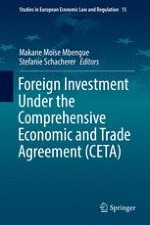2019 | OriginalPaper | Buchkapitel
Most Favoured Nation Treatment
verfasst von : Claire Crépet Daigremont
Erschienen in: Foreign Investment Under the Comprehensive Economic and Trade Agreement (CETA)
Verlag: Springer International Publishing
Aktivieren Sie unsere intelligente Suche, um passende Fachinhalte oder Patente zu finden.
Wählen Sie Textabschnitte aus um mit Künstlicher Intelligenz passenden Patente zu finden. powered by
Markieren Sie Textabschnitte, um KI-gestützt weitere passende Inhalte zu finden. powered by
